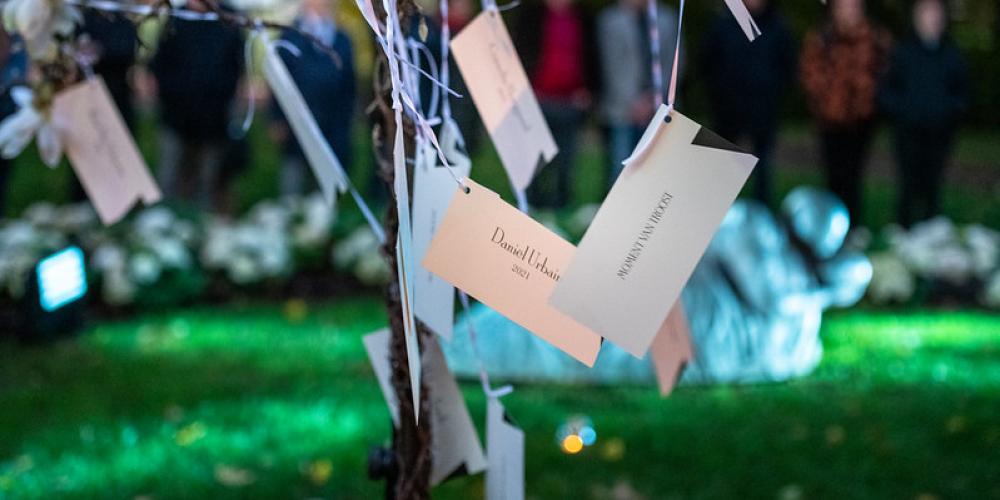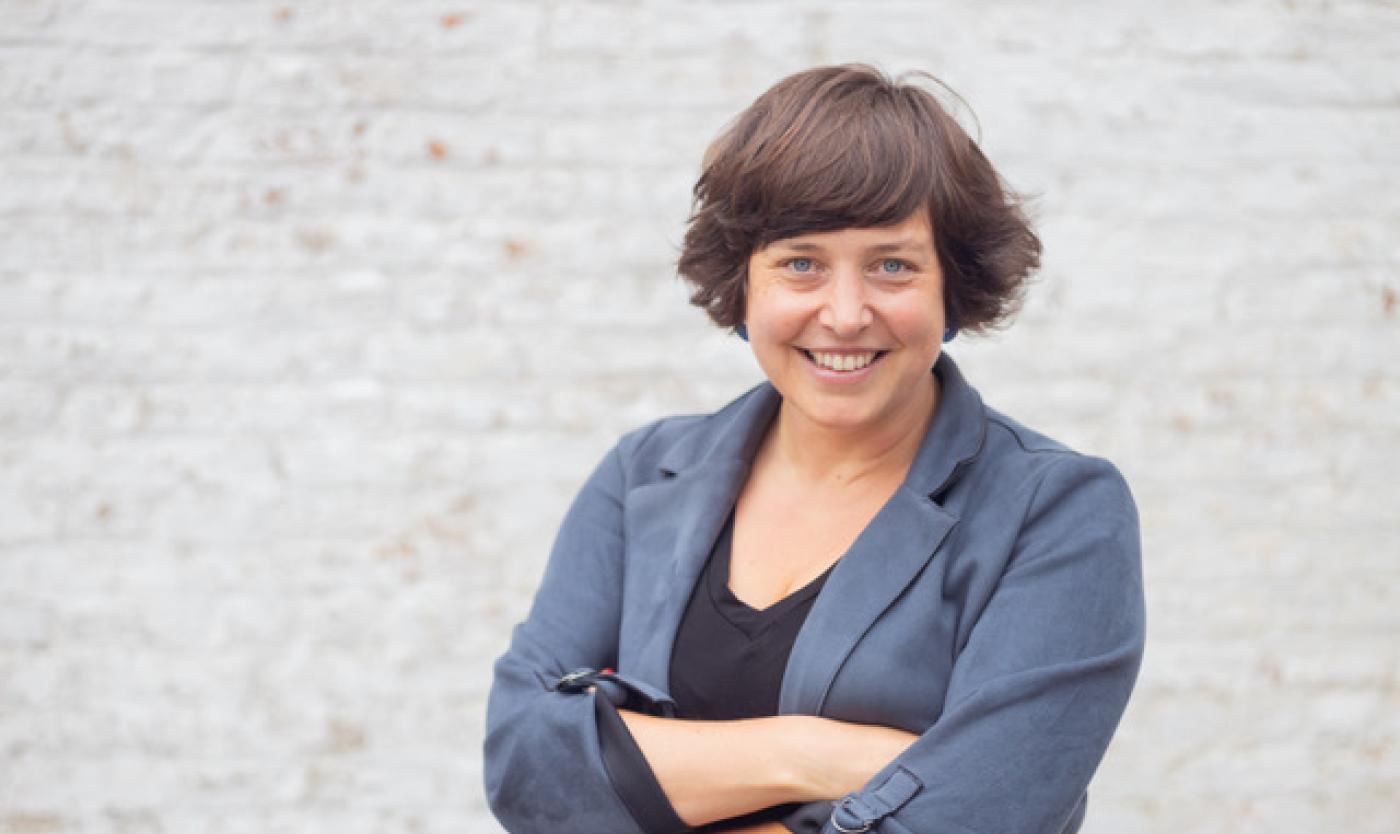
On Monday 18 and Tuesday 19 November, the VUB will focus on compassion and loss during its Compassionate Week. The event highlights themes that touch us all: serious illness, death, caregiving, and mourning. Liesbeth De Donder, Professor of Social Sciences: "Death and loss are very close to young people’s lives, and discussing them can be extremely powerful."
Professor De Donder, first of all, what is a compassionate community?
"The Compassionate Communities Expertise Centre (COCO) brings together 11 research groups at the VUB and aims to build communities that support people through serious illness, loss, death, and bereavement. A compassionate community seeks to normalise these themes, recognising them as part of life. In everyday life, these topics are often avoided, remain in the realm of taboo, and we struggle to talk about them. How do they aim to do this? By empowering and supporting individuals and groups who experience loss or death. Community, in this context, is very broad—it could mean a neighbourhood, workplace, or even an institution like a museum or a university such as ours. At the VUB, for instance, we have staff who are absent each day due to a bereavement, and students who, during exams, may lose a grandparent or parent. It’s crucial to know in advance how we address such situations."
How far have we come in adopting this compassionate approach, starting outside the university?
"During COVID, there was significant attention on themes like loss and death. Suddenly, it became clear how vital it is to be with someone who is ill or dying. Tragically, there were many instances where people in care homes or hospitals died alone, with only a Zoom or Skype connection on an iPad for a final farewell. I think that moment was a collective wake-up call, and since then, numerous new initiatives have emerged. For example, there’s Reveil, an organisation that began organising cemetery concerts a few years ago. Traditionally, people visit cemeteries alone, making mourning a private, intimate experience. For some, that works; others need more support. So Reveil asked: how can we carry this sorrow collectively? Quietly, but perhaps also through celebration and reflection. Another example is the charity Verbinding in Verlies (Connected in Loss). Their name says it all—they explore how mourning, which is often experienced alone, can be supported by others."

How Compassionate is the VUB?
"The late Rector Caroline Pauwels (who passed away in 2022 due to stomach and oesophageal cancer, ed.) helped lay the foundation for our Compassionate VUB. The compassionate community movement began in Australia, and VUB is the first university in Europe to adopt this model. For the past six years, a dedicated working group has been actively engaged in this effort, with members from the rectorate, the student support services, HR, and researchers from our COCO. This has already led to some concrete changes. Previously, a student experiencing a bereavement was required to report their absence and complete the necessary paperwork on the same day. Now, in such circumstances, we recognise that’s not something you can prioritise, and more flexibility is allowed—reporting can be done later. Additionally, we’ve developed protocols for situations like: what should we do if, for instance, a student passes away? How do we address this within the class group? Or similarly, how do we support a colleague returning to work after a long absence due to a close bereavement?"
Are there international good practices that could inspire us?
"Absolutely. Just a few examples: in Sheffield, there’s an annual Life, Loss and Death Festival, and in Australia, there are so-called Coffin Clubs, where people design and decorate their own coffins. Often, they even take these coffins home, where they’re used as, say, a bookcase. We’re also seeing new dynamics emerging in the funeral sector here in Belgium over the last five years, with initiatives like TRØST, Lou’k Up, and De Dood Leeft! These are wonderful examples of ‘alternative’ funeral planners."
What’s on the agenda for the upcoming Compassionate Week?
"A lot. For one, The Pilar will temporarily become a Compassionate Café, hosted by the organisation ‘Missing You’. People can come together to talk about loss, death, and ‘missing someone’. If the weather holds, there will also be a Comfort Tree by Lost & Co, where people can hang remembrance cards with messages for those they miss or to comfort others. There are also various workshops, such as a Poetry Workshop, where you can create or write things to help with grieving or offer comfort. The campus will be filled with small, meaningful initiatives. Last year, these activities seemed to make a difference for many people."
“Death and loss are very close to young people’s lives.”
One in five young people is a carer—will there be support for them during Compassionate Week?
"Absolutely. For instance, there’s a dedicated webinar on caregiving, which is a reality at the university too. Last year, I had a class of 60 students, and in the first week, two of them mentioned they were primary carers in very intense situations. I think it’s important to sit down with them and discuss what’s possible, which lessons and deadlines are manageable, and which are not. Fortunately, we do have flexibility in such cases."
What could be improved?
"Recently, I conducted an appreciative inquiry with a random group of students, focusing on the strengths of particular themes or events. For one group, I chose the theme of ‘bereavement’ and asked: what helped you cope with a loss, what was meaningful to you? I found that almost every 20-year-old in the group had already experienced a loss—not just of a grandparent, but also of a mother, a father, a friend, or even a friend’s parent. Death and loss are very close to young people’s lives, which might not be immediately apparent. If you haven’t experienced a loss yet, you’re almost an exception. Sharing these experiences with others seems to have a powerful effect, though it doesn’t happen often enough in practice, and there’s definitely work to be done in that area.
"One thing I want to add, which I also hear from my colleagues at End of Life Care, is that dying today is highly professionalised and medicalised. About half of palliative care deaths occur in a hospital. Even people in nursing homes are often brought to hospital for their final days. While medical care in hospitals is excellent, there can sometimes be an issue of ‘over-medicalisation’. In End of Life Care, it’s often said that ‘dying is a social event with a medical component, not the other way around’. I think that’s another area we can work on."
What do you hope to achieve with your public lecture?
"When we organise a webinar or seminar on this theme, we tend to attract people from healthcare and medicine, which is fantastic, of course. But I hope to broaden this reach. Through my lecture and our week, I’d love to connect with people from education, local authorities… We want to think with urban designers about how to integrate mourning spaces into public spaces. We’d like to collaborate with artists and museums to give grief and loss a place. After all, death and dying are part of life."